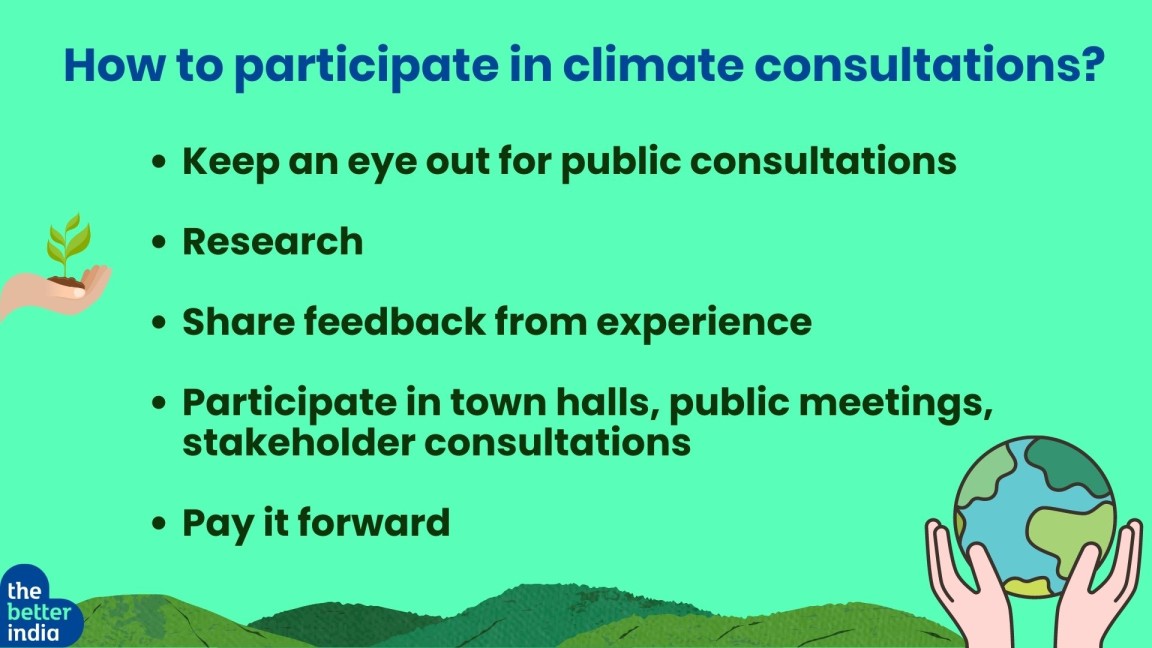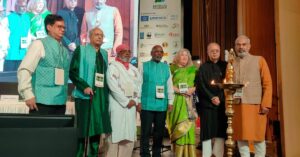Want to Play a Role in Shaping India’s Climate Laws & Policies? Here’s a One-Stop Guide
Civis, a platform that enables citizens to participate in public consultations in the domain of environment and policy has released Climate Voices. This is a handbook and guide for Indians to participate in environmental law-making and play an active role in shaping our climate policies.

Scrolling through social media can be overwhelming when you’re constantly bombarded with news and information about climate change and environmental policies, without being able to understand their meaning and repercussions. You might feel the effects of new laws on your environment, but may not have an idea of how they work.
Additionally, how do you make your voice heard in the law-making process? As members of a civic society, or even media organisations, how do you effectively communicate your deep concern for citizens and the impact of environmental laws? How do you ensure that everyone gets the opportunity to express their experiences and concerns about environmental laws, regardless of academic background?
As a law student, I engage with judicial precedents, policies, and laws in my everyday life, with a good understanding of legislations and their implications. That said, I still find it difficult to engage with the lawmaking process.
The Pre-Legislative Consultation Policy (PLCP) is the policy that essentially deals with engaging and including all stakeholders via public consultations. It is the process by which a Bill is scrutinised by all stakeholders prior to its enactment, and lays down the obligations of the government while proposing an amendment to the existing law or a new law altogether.
Civis, a platform that enables citizens to participate in these public consultations with ease, made some critical observations during the course of its work — particularly in the domain of environment and policy.
While there was an increase in the volume of consultations being conducted by the government in this specific area, the proposed laws on which feedback was being sought were not very accessible to many citizens. They were not available in regional languages, the responses received from citizens were not made public, mode of giving feedback was not always clear, to name a few.
A one-stop guide
These observations from Civis’ work indicate that public consultations are currently not conducted effectively. More importantly, a need arises to achieve the very purpose of consultation, i.e, to provide spaces for concerned stakeholders for effective and inclusive laws and regulations impacting the environment and our lives.
This is where ‘Climate Voices’ acts as one stop-guide to develop a participatory ecosystem which will not only aid implementation of PLCP Guidelines, but also fulfil the purpose of inclusion for a positive environmental change. The handbook aims to equip citizens with the knowledge and ability to use their voice and participate in direct climate action.
Although the handbook focuses on environmental legislations and consultations, it can also be useful for other areas of law that concern our day to day lives. The approaches listed in the handbook can also be applied to legislative consultations proposed in the field of labour law, road traffic, food safety, taxation, financial instruments, etc.
Whether you’re an individual citizen, part of a civil society organisation, or a media outlet, this guide provides unique insights into your role in the ecosystem and the nuances of how you can best make a difference.
As a citizen, and even as a law student, articulating a concern or lived experience in a way that can create impact seems a daunting task to me. The handbook mitigates my fears by providing guidelines — or rather, a check-list — of things to be mindful of.
Recently, I participated in a public consultation conducted by the Ministry of Education on the Pre-Draft National Curriculum Framework for School Education through Civis. As a student who has learned from lived experiences of transgender and non-binary gender communities about the hurdles they face in accessing public spaces, I was able to articulate my concerns to lay special emphasis in school curriculum to create gender sensitivity. While writing my suggestions, I referred to this check-list to articulate as meaningful suggestions as possible.
While this list pushes us to think more critically in terms of providing specific suggestions, lived experiences, context, public good and solution-oriented outcomes — which can be a difficult task — it also helps avoid generalisations and clear concerns to most pertinent issues. For easy and relatable understanding, the handbook also offers various case studies where citizens, through offering valuable suggestions and objections, can assist the government to draft more effective laws.
One such case is when the Delhi government was looking to introduce a new rule where petrol pump owners could be punished for dispensing fuel to vehicles without a PUC certification. A Delhi resident spoke of his experience and highlighted how such a rule would be not only difficult to implement, but also redundant, as many other rules for ensuring implementation of proper PUC certificate for vehicles already exist. Feedback given from personal experiences like this will help the government understand the potential impact and identify unintended consequences of draft laws.
How can you participate in climate consultations?
Participating in public consultations is as important a civic duty as voting or filing an RTI. While the handbook provides a detailed explanation on how you can participate, here are a few important things for you to know:
- Keep an eye out for public consultations: Stay alert for announcements on public consultations. These can be through newspapers and other media outlets, civil society organisations sharing updates, etc.
- Research: Try and understand the draft law fully before giving your feedback. Online magazines like Talk Dharti to Me provide explainer blogs and articles to help understand public consultations on climate policies better. Organisations like Youth for Climate India host talks and discussions in their Climate Libraries to explain the implications of proposed laws and share resources to understand them better.
- Sharing feedback from experience: Your experiences provide nuanced insights to the government department drafting the law.
- Participate in town halls, public meetings, stakeholder consultations: At times, the government department seeking feedback holds physical meetings like public hearings in areas where the proposed law would be in effect. Attend these meetings, understand the extent of the proposed law from the organisers, share your personal experiences on the subject matter and help spread awareness on such meetings.
- Pay it forward: Share what you learnt with family friends, social media

Why is this important for a citizen to know?
At times, you might be able to process certain pieces of information, but not fully understand the other side of the discussion, or even different perspectives. For critically evaluating suggestions, it becomes important to have more informed perspectives.
This is where you and I can read newspaper articles, listen to certain interviews and participate in local discussions, even if it is at our dinner tables.
To strengthen informed public participation and create an ecosystem beyond the letter of the law, the handbook provides various examples of how media outlets can engage with citizens, provide simplified yet informed opinions and hold the government accountable by actively choosing to report them. As citizens, it also sets us our expectations from our most reliable sources for information.
The ‘Climate Voices’ handbook is not just a guide, but also a call to action for all citizens who care about the environment and want their voices to be heard. It empowers us to engage with the lawmaking process, to express our concerns and experiences, and to hold our government accountable for creating effective and inclusive laws and regulations. If you found our stories insightful, informative, or even just enjoyable, we invite you to consider making a voluntary payment to support the work we do at The Better India. Your contribution helps us continue producing quality content that educates, inspires, and drives positive change. Choose one of the payment options below for your contribution- By paying for the stories you value, you directly contribute to sustaining our efforts focused on making a difference in the world. Together, let’s ensure that impactful stories continue to be told and shared, enriching lives and communities alike. Thank you for your support. Here are some frequently asked questions you might find helpful to know why you are contributing?

Samrath Kaur Kalsi is an intern at Civic Innovation Foundation. This article is part of a series written to bring attention to ‘Climate Voices’, a definitive handbook on the how and why of public participation in environmental legislation, published by Civis. You can learn more about the handbook here.
Edited by Divya Sethu
This story made me
- 97
- 121
- 89
- 167












